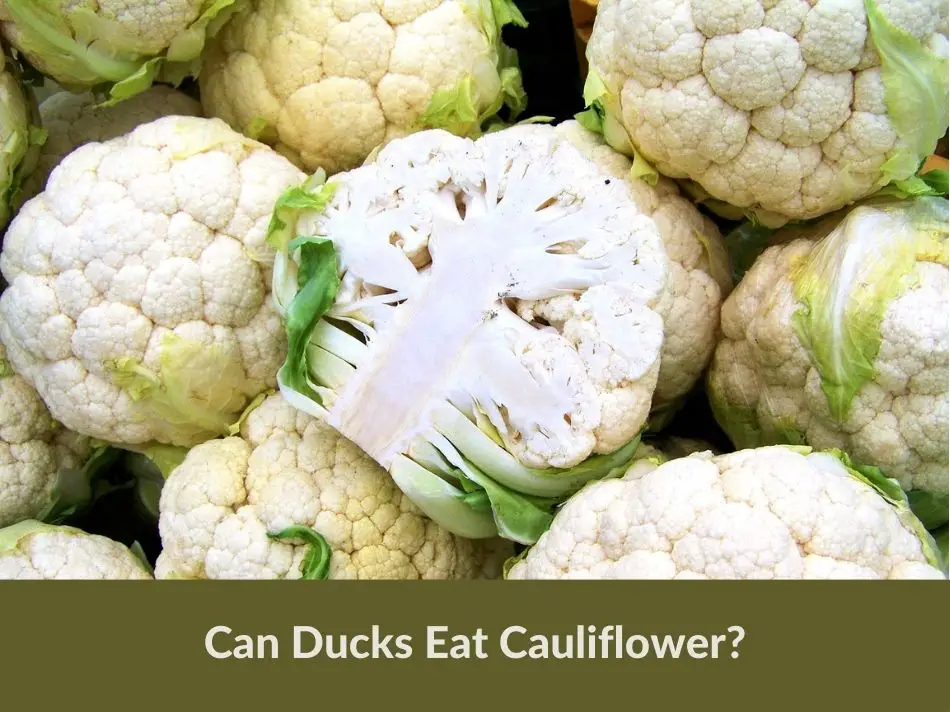Ducks, in their natural habitat, enjoy a varied diet. They nibble on aquatic plants, small fish, insects, and even tiny crustaceans. For our domesticated pals, caretakers often provide a balanced diet of duck pellets, grains, and occasional treats. But, can ducks eat cauliflower?
Yes, ducks can eat cauliflower. It’s a safe and nutritious treat for them. But, like with every treat, it’s important to feed the ducks in moderation in addition to their diet.
In this article, we’ll explore if ducks can eat cauliflower. We’ll cover how often to feed it to them, the benefits, and the best ways to serve it. Whether you care for ducks or just like to visit them at the park, this guide will help you understand their dietary needs better.
How Often Can I Feed My Ducks Cauliflower?
While ducks might quack with joy over cauliflower, it’s best to offer it as an occasional treat. Once or twice a week is enough. A good rule of thumb is that treats should not exceed 10% of the duck’s diet.
Can Ducklings Eat Cauliflower?
Tiny beaks, tiny bites! Ducklings can nibble on cauliflower, but it should be given in smaller, manageable pieces. Ensure it’s soft enough for their little beaks. Always serve with water to make the cauliflower easier to swallow.
Cauliflower Nutritional Value
Below is the nutritional value of 100 grams of cauliflower.
- Calories: 25
- Protein: 1.9 g
- Total Carbohydrates: 5 g
- Dietary Fiber: 2 g
- Sugars: 1.9 g
- Total Fat: 0.3 g
It also contains several vitamins and minerals as listed below.
- Vitamin C
- Vitamin K
- Vitamin B6
- Folate (B9)
- Pantothenic Acid (B5)
- Thiamine (B1)
- Riboflavin (B2)
- Niacin (B3)
- Potassium
- Manganese
- Magnesium
- Phosphorus
Are Cauliflower Healthy for Ducks?
Absolutely! Cauliflower is packed with vitamins and minerals beneficial for ducks. Below is a short list of benefits.
- Vitamin C: Boosts duck immunity and promotes vibrant feathers.
- Vitamin K: Essential for proper blood clotting, keeping ducks safe from injuries.
- Vitamin B6: Helps ducks metabolize food for energy during their pond escapades.
- Folate (B9): Vital for healthy duckling development inside their eggs.
- Pantothenic Acid (B5): Converts food into energy, fueling ducks’ lively antics.
- Thiamine (B1): Ensures ducks convert carbs into energy for long swims.
- Riboflavin (B2): Promotes good vision and radiant duck skin.
- Niacin (B3): Aids in digestion and nerve function, keeping ducks at their best.
- Potassium: Maintains muscle and nerve function for balanced paddling.
- Manganese: Strengthens duck bones for robust adventures.
- Magnesium: Helps ducks relax muscles and produce energy.
- Phosphorus: Fortifies duck bones and teeth for healthy nibbling.
How To Feed Cauliflower To Ducks
Before you waddle over with cauliflower in hand, here’s how to do it:
- Wash the Cauliflower: Ensure it’s free from pesticides and other chemicals.
- Break into Small Pieces: Ducks don’t have teeth, so smaller chunks are easier for them to digest.
- Serve Raw or Steamed: Avoid any seasonings or oils. Simple is best for our feathered friends.
- Always Provide Water: Ducks need water to help swallow and digest food. Ensure they have access to clean water whenever you’re offering treats.
More Vegetables Ducks Can Eat
Ducks loves vegetables and the best part is that they are a healthy and nutritious. These green delights not only provide essential vitamins and minerals but also offer a crunchy treat that ducks love. If you’re considering feeding your ducks some veggies, here are a few more options you might want to explore:
Remember to always introduce new foods in moderation and ensure they are free from pesticides or harmful chemicals.
Conclusion
Ducks bring joy to many, whether they’re in our backyards or the local park. As caretakers or park visitors, it’s our responsibility to ensure they’re fed healthily. Cauliflower is a safe and nutritious treat for ducks, but like all goodies, moderation is key.
Always ensure ducks have access to clean water, especially when feeding them. And remember, while it’s fun to feed our quacking friends, their primary diet should always be a priority.
So, the next time you’re by the pond and thinking of sharing a snack, know that a piece of cauliflower will get a quacking approval!


